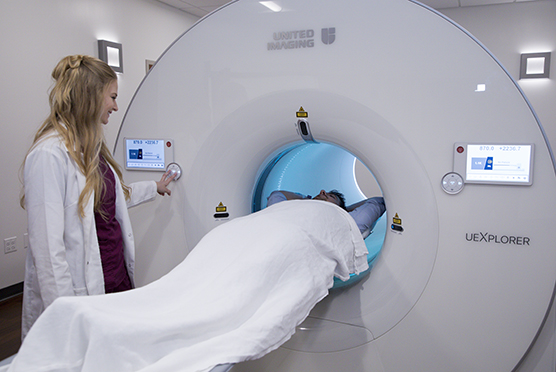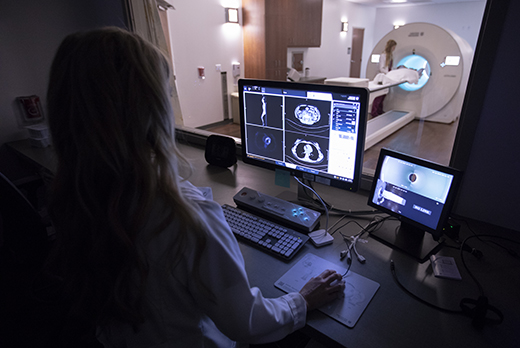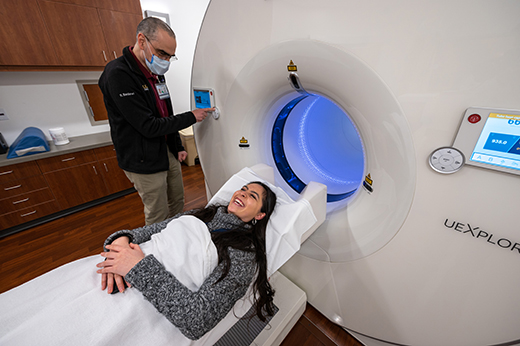PET Scan
Our advanced medical imaging options include a total-body PET/CT scan for complete head-to-toe imaging in one scan. We use advanced imaging technology to diagnose conditions and guide treatment plans.
Medically reviewed by Ramsey Badawi, Ph.D. on Dec. 04, 2023.

The Latest PET Scan Technology
At the UC Davis Health Department of Radiology, our specialists use advanced positron emission tomography (PET) scan technology to diagnose diseases and guide treatments. A CT scan takes place at the same time (PET/CT scan).
Why Use PET Scans?
PET scans are a type of nuclear medicine imaging. During this medical imaging scan, you receive an IV of a safe radioactive sugar substance called a radiotracer. These tracers are absorbed in areas of your body where cells are more active than normal, making them easier to see on PET scan images. This can include tumors and inflamed regions.
Our experts use PET/CT scans to:
- Detect and stage cancers
- Diagnose brain disorders, including Alzheimer’s disease, Parkinson’s disease and epilepsy (seizures)
- Observe blood flow to your heart and diagnose coronary artery disease and heart disease
- Guide treatment decisions and assess the effectiveness of treatments
Advanced PET Scan Options
Our radiologists use advanced PET scan technology to detect issues that other imaging tests might miss. Our team quickly identifies conditions and partners with other care team members to develop an effective treatment plan.
EXPLORER Total Body PET Scanner
The EXPLORER Total Body PET Scanner is the only FDA-approved system that creates 3D images of your entire body in one scan. The EXPLORER scan performs whole-body imaging scans faster and more comfortably than traditional PET scans while using less radiation. The high-quality images help our team detect small tumors, study blood flow and see how medications settle in organs and tissues.
Multi-Slice PET/CT Scanner
Our multi-slice PET/CT scanners combine PET scan images with hundreds of cross-sectional CT scan images. The combined scans create detailed 3D images of a specific body area. For the CT scan, you may receive an oral or injectable contrast dye to sharpen the images.
Request an Appointment
As Sacramento's No. 1 hospital, you'll benefit from unique advantages in primary care and specialty care. This includes prevention, diagnosis and treatment options from experts in 150 specialties.
Referring Physicians
To refer a patient, submit an electronic referral form or call.
800-4-UCDAVIS
Patients
Call to make an appointment.
Consumer Resource Center
800-2-UCDAVIS
Your PET scan preparation depends on factors like the type of scan and your health conditions. A total-body PET scan requires being fully inside the scanner. Your head is usually outside a multi-slice PET/CT scanner. If either test makes you anxious, your provider can prescribe a sedative before the scan to make testing more comfortable.
-

Before Your PET Scan
You will need to fast (not eat) for 4 to 6 hours before the test, although you can drink plain water. You may also need to stop taking certain medications and not exercise. Your provider’s instructions may vary, depending on your unique situation.
-

During a PET Scan
Our radiology team performs your PET scan as quickly as possible while ensuring the clearest images. It can take 60 minutes for the radiotracer to travel through your body before imaging can start.
-

After Your PET Scan
If you take a sedative before the scan, someone needs to drive you home. A radiologist will review the PET scan images and send results to your doctor, usually within 24 hours. Your doctor will discuss next steps based on the findings.
Home Care
Your at-home recovery after a PET scan depends on the test and your overall health. You should follow your care team’s instructions for a safe recovery.
Drink Fluids
If you received contrast dye for a PET/CT scan, drink plenty of fluids to help flush the substance from your body.
Follow Up With Your Provider
Depending on your scan results, you may need to schedule appointments for treatments with different UC Davis Health specialists.
Safely Resume Activities
A PET scan isn’t invasive or painful. You can resume normal activities after the test. If you felt anxious, take time after the scan to relax.
When to Contact Your Provider
In rare instances, the contrast dye for a PET/CT scan can cause an allergic reaction. Call your provider if you develop signs of a reaction or infection, such as fever, hives, redness or swelling.

Ranked among the nation’s best hospitals
A U.S. News & World Report best hospital in cardiology, heart & vascular surgery, diabetes & endocrinology, ENT, geriatrics, neurology & neurosurgery, and pulmonology & lung surgery.

Ranked among the nation’s best children’s hospitals
U.S. News & World Report ranked UC Davis Children’s Hospital among the best in neonatology, nephrology, orthopedics*, pediatric & adolescent behavioral health, and pulmonology & lung surgery. (*Together with Shriners Children’s Northern California)

Ranked Sacramento’s #1 hospital
Ranked Sacramento’s #1 hospital by U.S. News, and high-performing in aortic valve surgery, back surgery (spinal fusion), COPD, colon cancer surgery, diabetes, gynecological cancer surgery, heart arrhythmia, heart failure, kidney failure, leukemia, lymphoma & myeloma, lung cancer surgery, pacemaker implantation, pneumonia, prostate cancer surgery, stroke, TAVR, cancer, orthopedics, gastroenterology & GI surgery, and urology.

The nation’s highest nursing honor
UC Davis Medical Center has received Magnet® recognition, the nation’s highest honor for nursing excellence.

World-class cancer care
One of ~59 U.S. cancer centers designated “comprehensive” by the National Cancer Institute.

A leader in health care equality
For the 13th consecutive year, UC Davis Medical Center has been recognized as an LGBTQ+ Healthcare Equality Leader by the educational arm of America’s largest civil rights organization.
